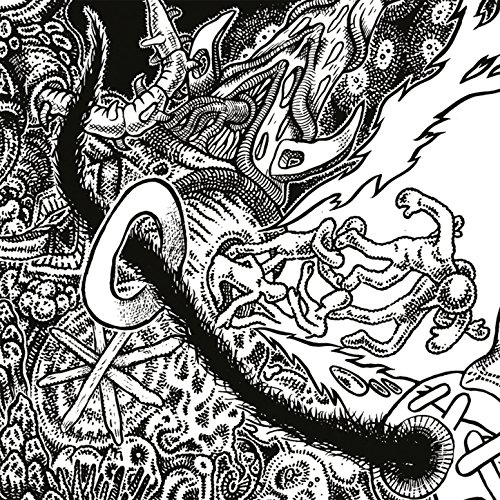
Shackleton
Music For the Quiet Hour/The Drawbar Organ EPs
Release Date: Dec 4, 2012
Genre(s): Electronic, Club/Dance
Record label: Woe To The Septic Heart!
Music Critic Score
How the Music Critic Score works
Buy Music For the Quiet Hour/The Drawbar Organ EPs from Amazon
Album Review: Music For the Quiet Hour/The Drawbar Organ EPs by Shackleton
Exceptionally Good, Based on 6 Critics
Based on rating 4.5/5
“Music is the weapon of the future […] Reality is clearer.” Those words, spoken by collaborating vocalist Vengeance Tenfold, ring true in the defining of this album’s thesis. Sam Shackleton’s lastest musical output focuses on the exploration of the visceral relationship that a listener has with the sonic realm, ideas that span over two simultaneous releases: Music For the Quiet Hour and The Drawbar Organ EPs; one serving as a sort of experimentation, the other employing those ideas in the form of a full-blown orchestral work. The ideas in question are the artifacts found in sonic qualities and the silence that it overcomes and participates with.
Based on rating 4.5/5
Sam Shackleton is one of those artists who could follow his muse down almost any path as lengthy and meandering as his basslines, and run into accolades at every stop. The UK's foremost shamanic summoner hasn't necessarily embarked on a career full of twists and turns—what determines a curveball for one of electronic music's most singular artists is up for debate—but it's rarely been less than challenging. Amidst the considerable hubbub surrounding his Honest Jon's releases and his Fabric mix in 2010, it's easy to forget that he founded a new label that same year, Woe To The Septic Heart.
Based on rating 81%%
ShackletonMusic For The Quiet Hour/The Drawbar Organ EPs[Woe to the Septic Heart; 2012]By Will Ryan; June 5, 2012Purchase at: Insound (Vinyl) | Amazon (MP3 & CD) | iTunes | MOGTweetOutside of dance music, Sam Shackleton isn't quite the household name the aforementioned form would have him be, but even beyond the British producer's ties to rarified strands of bass music he's become a shorthand for an oily shade of taciturn, world music-informed beat-oriented weirdness. On their mega-long debut earlier this year, London dubstep collective, LHF, sounded like they'd stumbled across Shack in Dubai and Demdike Stare might be scary, but Shackleton sounds like he's been to West Africa while the British duo has only had nightmares about it. 2010's Three EPs served as a hard-lined, spiderweb-meeting-at-the-middle, Shack-purified debut and last year's excellent collaboration with Pinch, simply titled Pinch & Shackleton, helped massage Shackleton's aesthetic touchstones into something altogether approachable; as if Rob Ellis had been helping the Berlin-resident with some assimilation initiative to come out of whatever darkened, tangled mystical hovel he usually resides to smile at all the shiny people (without too much success, thankfully).
Based on rating 7.4/10
Shackleton is incredibly prolific. He follows last fall's surprising dubstep throwback collaboration with Pinch with a massive offering on his own Woe to the Septic Heart label. Available either as an impressive (and pricey) vinyl box set or as 2xCD compilation, Music for the Quiet Hour / The Drawbar Organ EPs sees Shackleton sink even further into grotesque dub madness.
Opinion: Fantastic
If you visit Wikipedia’s page on dubstep there is a refined example of what a bass drop incorporates, using Sam Shackleton’s “Naked” as a vivid illustration. For all the modifications the genre has outlived since its inception (including Skrillex’s awful take on it) artists like Shackleton have continued to envelop the spectrum of dubstep into something much more than wobbly bass and the aforementioned bass drop. With the celebration of his own label, Shackleton released a box set that features a collection of EPs, tied together as The Drawbar Organ EPs, and a full-length LP, Music for the Quiet Hour.
Opinion: Excellent
Where do you go from zero? Mirroring the demise of Skull Disco and the depraved sketchings of Zeke Clough's artwork, Sam Shackleton's music committed a gruesome and protracted suicide over the course of his label's final releases, self-eviscerating in perversely gratifying slow-mo. By the time of Soundboy's Suicide Note at the end of 2008, little was left save dry bones, musty air and tortured babbling, like psychic residue left stubbornly clinging to his music's withered corpse. Surgical instruments wiped clean, so to speak, the next stage for Shackleton has been to slowly breathe colour and life back into his music.
'Music For the Quiet Hour/The Drawbar Organ EPs'
is available now

